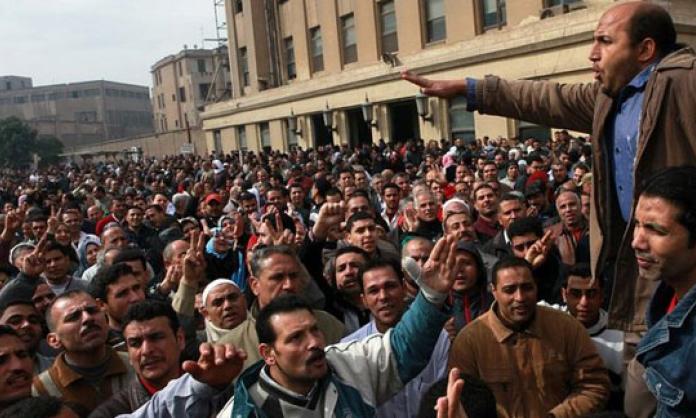Seventeen thousand workers at the largest state-owned textile company in Egypt have led the longest and biggest strike since army ex-general Abdel Fattah el-Sisi became president 17 months ago.
Workers from Mahallah’s Misr Spinning and Weaving Company went on strike in late October to demand a 10 percent annual social bonus.
There is a long history of militant labour and political struggles at the company. Its workers played a key role during the 2011 revolution.
Tamer Wageeh, an Egyptian socialist, told Red Flag that Sisi had approved, but then reneged on, the social bonus for the Mahallah workers and other textile workers in the Nile delta region.
“[It] was approved by the president of the republic for all workers who are not under the jurisdiction of the civil servants law, which means it includes the public business sector workers of which Al-Mahallah workers are part”, he said via email.
“The Weaving and Textile holding company (one of the holding companies of the public business sector) decreed that the 10 percent raise should be given to all the companies’ workers, with the exception of Al-Mahallah and Kafr al-Dawwar workers (Kafr al-Dawwar is a another large weaving and textile company in the Nile Delta).
“The condition was: Al-Mahallah workers should end their strike first and then, within two days, the raise would be given to them. The workers decided, ‘No we will go on with our strike until the decree to give us the raise is issued’.”
In keeping with a devastating escalation of anti-strike and anti-protest repression in Egypt since the defeats of the revolutionary uprisings of 2011 to 2013, Mahallah textile company bosses and government authorities used old tactics and new laws to try to beat the strike leaders and workers into submission.
“One of the main tactics of the state is to punish (basically kick out) the workers who lead any strike (sometimes they are even tried)”, Wageeh said.
“So one of the demands … was to return previously laid off workers who were kicked out because they led strikes. Another demand was that no-one should be punished for participating in the current strike.
“The reason why the state does this is because it wants to appease the workers by giving them their financial demands, but make sure such rebellious acts are not repeated … This is an old tactic”, he said.
One heroic worker, Mohamed Al-Attar, who has a long history of leading strikes and political movements against former dictator Hosni Mubarak, was singled out and interrogated a day before the strike began. He did not back down.
On 1 November, the workers ended their 11-day action when the investment minister signed an agreement that all workers would be paid the 10 percent bonus retrospectively.
It remains to be seen whether the strike leaders will be punished, though it is expected the bosses and the state will try.
This strike, unlike those that prefigured the revolutionary uprisings of 2011, does not seem to have had a broader social impact in the country, despite the fact that it was planned to coincide with parliamentary elections.
However, Haitham Mohamadain, a member of the Revolutionary Socialists and a well-known labour activist, told the British Guardian on 31 October that contagion within the workers’ movement is under way. “This current strike has opened the door”, he said.
In 2008, a coalition of Mahallah workers, Egyptian youth and pro-democracy activists ignited a movement that prefigured the revolution of 2011.
When youth discovered that police had infiltrated meetings of Mahallah workers and repressed planned strikes, they took to the streets for the first time in decades and confronted the regime.
Not coincidentally, in recent days the regime has announced that students from three organisations are banned from running in student elections on university campuses: the Muslim Brotherhood youth, members of the 6 April youth movement and members of the Revolutionary Socialists. All three groups played key roles in the revolution.
The workers of Mahallah and the radical youth face very difficult times. With the Egyptian economy in crisis and plans afoot to “downsize” and “modernise” in the textile sector, workers in these hugely significant public factories have a fight on their hands.











